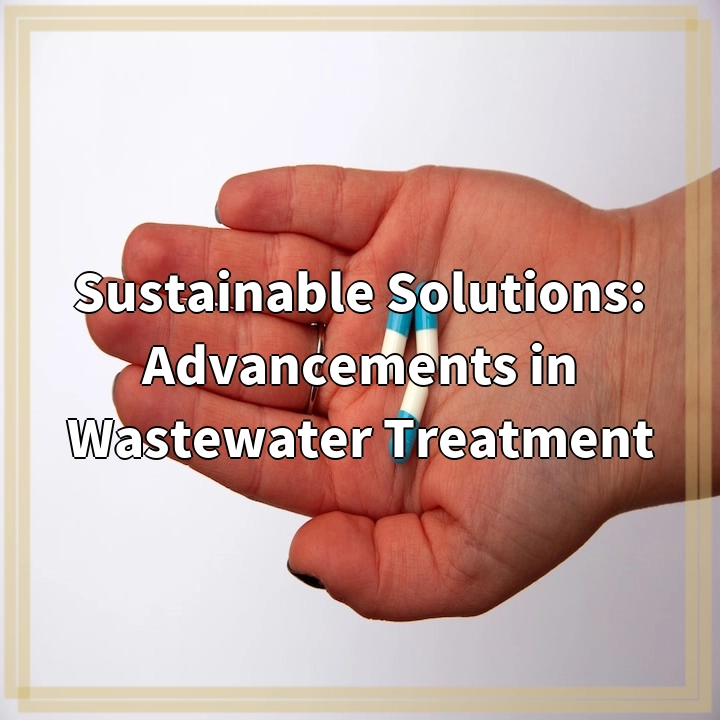
What is Sustainable Solutions: Advancements in Wastewater Treatment?
Wastewater treatment is a vital process that ensures the safe disposal or reuse of wastewater from various sources such as residential, industrial, and agricultural activities. Traditional wastewater treatment methods often involve high energy consumption, chemical usage, and result in the release of harmful byproducts into the environment. Sustainable solutions in wastewater treatment aim to address these issues by implementing innovative technologies and practices that minimize environmental impact while maximizing resource recovery.
Real-World Problems in Wastewater Treatment
Despite the importance of wastewater treatment, there are several challenges and issues that persist in this field. These problems include:
Pollution and Contamination
Improperly treated or untreated wastewater can lead to the contamination of natural water bodies, including rivers, lakes, and oceans. This pollution can harm aquatic life, affect ecosystems, and even pose risks to human health when used for drinking or agricultural purposes.
Energy Consumption
Traditional wastewater treatment plants consume significant amounts of energy to operate their processes, including pumping, aeration, and sludge treatment. This energy consumption contributes to greenhouse gas emissions and places a strain on limited energy resources.
Chemical Usage
Many conventional wastewater treatment methods rely on the use of chemicals such as chlorine, alum, and disinfectants to remove impurities. These chemicals can have detrimental effects on the environment and may not be effectively removed during the treatment process, leading to residual chemical contamination in the treated wastewater.
Waste and Byproduct Management
Traditional wastewater treatment generates significant amounts of sludge and other byproducts, which require disposal or further treatment. Improper management of these wastes can pose environmental risks and may result in the release of pollutants into soil and water sources.
High Costs
Establishing and maintaining wastewater treatment facilities can be financially burdensome, particularly for smaller communities or developing regions. The high costs involved may hinder the implementation of sustainable wastewater treatment solutions, perpetuating the use of outdated and inefficient practices.

Solutions for Sustainable Wastewater Treatment
To address the real-world problems associated with wastewater treatment, innovative and sustainable solutions are being developed and implemented. These advancements aim to improve efficiency, minimize environmental impacts, and promote resource recovery. Here are some notable solutions:
Advanced Treatment Technologies
Advancements in treatment technologies, such as membrane bioreactors, anaerobic digestion, and advanced oxidation processes, offer more efficient and effective ways to remove contaminants from wastewater. These technologies reduce the reliance on chemical usage and energy consumption while producing higher-quality treated water.
Energy Efficiency and Renewable Energy
Efforts are being made to optimize energy usage in wastewater treatment plants. This includes implementing energy-saving equipment, optimizing processes, and utilizing renewable energy sources such as solar and biogas. Combined heat and power systems can also be implemented to capture and utilize the energy generated during the treatment process.
Nutrient Recovery and Reuse
Sustainable wastewater treatment aims to recover valuable nutrients present in wastewater, such as nitrogen and phosphorus. These nutrients can be used as fertilizers in agriculture, reducing the need for synthetic fertilizers and closing the nutrient loop. Innovative technologies like struvite precipitation and biological nutrient removal facilitate this nutrient recovery process.
Decentralized and Nature-Based Systems
Decentralized wastewater treatment systems, including constructed wetlands and natural filtration systems, provide effective and low-impact alternatives to centralized treatment plants. These nature-based systems utilize natural processes to remove contaminants, conserve water, and enhance biodiversity, making them environmentally friendly and cost-effective solutions.
Education and Public Awareness
Promoting public awareness about the importance of wastewater treatment and sustainable practices is crucial. Education campaigns can encourage individuals and communities to adopt water conservation methods, reduce the use of harmful chemicals, and properly maintain their septic systems, thereby reducing the burden on centralized treatment facilities.















